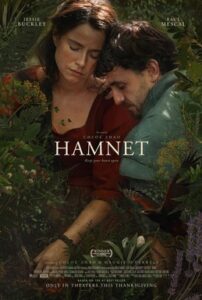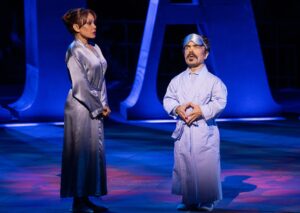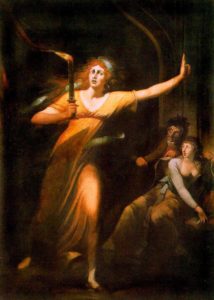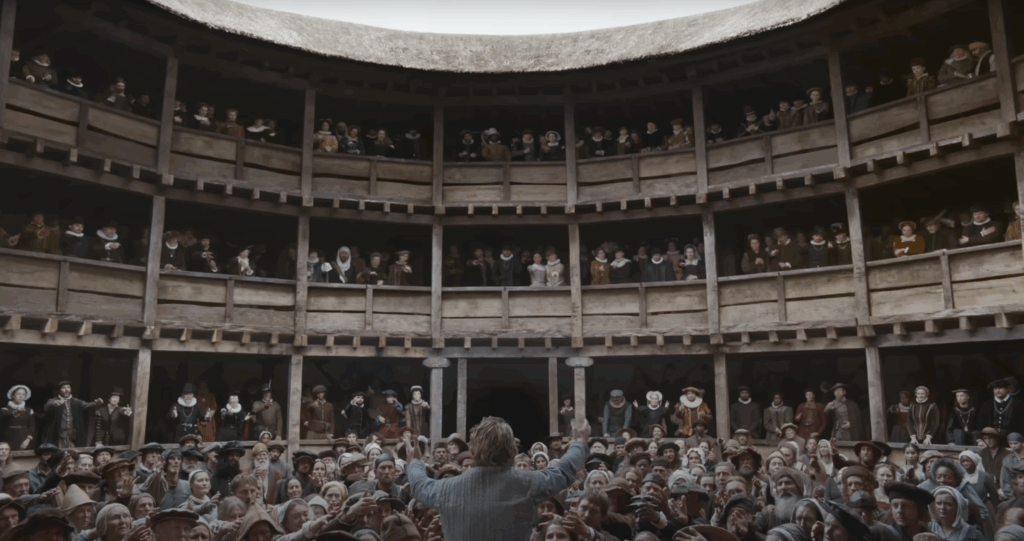It’s the end of the calendar year, the time when all the most artsy award contender movies all flood the theatres to get it under the deadline. This year, we have to pay more attention than usual, though, because Shakespeare is in the mix. The movie version of Hamnet, by Maggie O’Farrell, is in theatres now. I made sure to read the book before I saw it – review here.
Starring Academy Award Nominees Jesse Buckley and Paul Mescal, and directed by Academy Award Winner Chloé Zhao, this one is absolutely showing up on every list.
But Did I Like It?
Somebody called it Shakespeare In Love 2: Shakespeare Is Sad and I wish I’d thought of that.
This might be the first time I’ve ever said this, but I’m annoyed by how much Shakespeare content is in this. The more you know about Shakespeare, the less you’re going to like this movie.

Let’s back up. This is going to contain spoilers if you don’t already know Shakespeare’s biography, but I’m assuming that most readers of this blog already know the story.
The book did something fascinating that at first annoyed me, but I came to love. Shakespeare’s name isn’t ever mentioned in the book (I think maybe once). He’s barely in it. The book is told from Agnes/Anne’s perspective – a woman forced into a marriage by pregnancy, left in Stratford while her husband runs off to London to build a better life for himself (and, in theory at least, them). All while the plague is all around them, Life is not easy for Agnes, especially once tragedy strikes the family. The book does a spectacular job of telling the story of this wife and mother who just happens to be “Mrs Shakespeare.” The famous guy is secondary to the story.
Well, somebody in Hollywood missed the memo, because all the marketing material says is Shakespeare Shakespeare Shakespeare. Look how pretty Paul Mescal is! Make sure to point the camera directly at his face as many times as you can, and just leave it there. Let them get lost in his eyes.
I’m not even being facetious. You know how some writer / directors are famous for the “walk and talk” style? We’ll call what Zhao does something more like “stare a lot and sometimes talk.” There are many scenes of Buckley and Mescal just staring at each other. There’s also no music to speak of in these scenes, just dragging awkwardness.
The movie also has no faith in telling Agnes’ story, so they inject lots of extra scenes of Shakespeare in London. It was important in the book not to have that, because Agnes didn’t get that luxury. Her husband’s absence was a mystery, and a real point of tension in their relationship. The audience should sympathize with her, especially after their child dies and her husband says, “Well, back to London I go.” Showing Shakespeare’s own grief and pain is completely unnecessary, in my opinion, and weakens the movie.
Let me pause for a second and say nice things before getting to the parts I really hate. This is a beautiful movie. The effort that went into the scenery and costumes is outstanding. If this movie’s getting any awards, it should be in those areas.
Jesse Buckley is, to put it simply, her generation’s Meryl Streep. She’s brilliant in every scene, and the movie would be better by having more of her in it. She’s called upon to act out both her child’s birth and death in a single movie. If that’s not range, I don’t know what is. We’ve often referred to Constance’ famous speech from King John about grief (“Grief fills the room up of my absent child, Lies in his bed, walks up and down with me, Puts on his pretty looks, repeats his words..”) and Buckley is the embodiment of that speech. Her fury at her husband stealing their child’s name to use in his little play, storming to London to confront him, literally screaming at the actors mid-performance that it is not theirs, they can’t have it? Amazing. I won’t spoil everything but I will say that even after that moment it gets even better. (Before unfortunately getting worse.)
Let’s talk about the direction. My wife came out of the theatre asking, “I don’t understand why it kept showing the table.” It took me a second to realize what she meant, but she’s right. The camera spends much of our two hour runtime on the scenery, even when the main characters are having a conversation. Agnes and Will are talking, but are they on screen? Nope, let’s look at the table. Or a leaf on a tree outside the window. Or various big black holes, like the gap in the tree roots, or the exit from the stage. I’m sure there’s some deep reason for this choice, but I much prefer a more grounded approach. When people are talking I want to see their faces.
What About The Shakespeare?
As I mentioned, there’s almost no Shakespeare content in the book, except right at the end. I wish they’d kept it that way, the ending would have been more powerful. Instead, some producer somewhere no doubt read the script and said, “Where’s the balcony scene? People love the balcony scene, add the balcony scene.” So yes, spoiler alert, we get a shot of Shakespeare – back when Susannah was just a baby – working upstairs on “But soft what light through yonder window breaks,” tapping out the iambic pentameter as he recites it. Bleh. I think that scene might have already been in Shakespeare In Love but that is not why that one got its Oscar. Never mind that this was probably 10 years before the play was written. The man was just that good, I guess? A regular Earl of Oxford.
But wait, there’s more! Of course, Shakespeare shared his work with the family, being the good, present, and attentive father that he was (at least, in this story). He choreographs stage combat with Hamnet. The children put on a play for their mother. What do they recite? When shall we three meet again, in thunder, lightning, or in rain? Sure, why not? Who cares that Hamnet died in 1596 and Macbeth wasn’t written for another 10 years?
Can it get worse? Oh, gentle reader, brace yourself. You do know for certain that “To be or not to be” is Hamlet contemplating suicide, right? We know, because in this movie, in his grief, we literally get a shot of Shakespeare debating whether to throw himself into the river while reciting that soliloquy. That’s got to be the worst decision they made. The movie’s already being called “grief porn.” They already injected a bunch of scenes of how Shakespeare dealt with the death of his son, because they didn’t have enough faith in the child’s. mother’s grief. Instead they have to take a scene like that and say, “You know what would be great here? What if he recites To be or not to be?” And all the other writers in the room say “Brilliant!” when in reality it ruins the movie.
See It or Not?
People always ask me, “Would you recommend it?” about movies and I never know what to say. My opinion is my opinion, and yours may vary. As noted, it’s a visually stunning movie, and Jesse Buckley alone deserves to be seen. I’d like to say the same about Paul Mescal but really, I so resent the extra footage of him that they jammed in there, I can only really see him as a pretty face they kept shoving in there because they didn’t have enough faith in Buckley’s, which is a true shame. This movie could have stayed far closer to the book, removed all the extra Shakespeare, focused entirely on Agnes, and been an even stronger Oscar contender, if you ask me.






